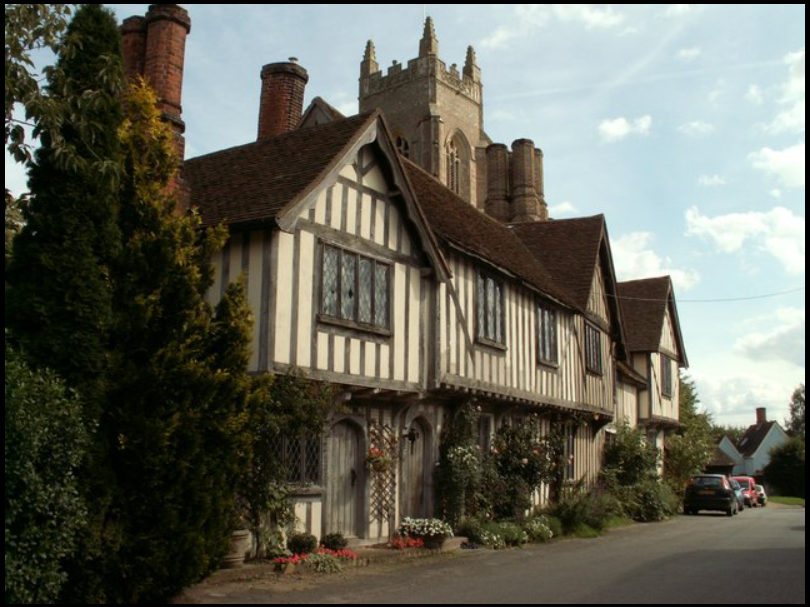Webmaster Notes
Need to expand on the Howard family
The Howard family is an English noble family founded by John Howard, who was created Duke of Norfolk (third creation) by King Richard III of England in 1483.
William Tendring (1349 - 1408) https://www.wikitree.com/wiki/Tendring-3
Catherine_Howard https://en.wikipedia.org/wiki/Catherine_Howard - the fifth wife of King Henry VIII.
Stoke By Nayland
Stoke by Nayland is a village in South Suffolk near the Essex border
and North of Nayland on the river Stour.
Stoke by Nayland is an easy day-trip from Belchamp Walter and there are some interesting things to see in the church. The history of the region and the country are represented here as the Howard family are associated with the village. John Constable has also used the church as a subject of his paintings. The village may be a place to visit in conjunction with Flatford Mill.
Manors of Suffolk - Coppinger, 1905
W. A. COPINGER, M.A., LL.D., F.S.A., F.R.S.A.
Of the Middle Temple, Barrister-at-law. Professor and Dean of the Faculty of Law in the
Victoria University of Manchester. Sometime President of the Bibliographical Society. Author of
"County of Suffolk: Its History as Disclosed by Existing Records," &c.
In the Confessor's time Robert or Rodbert held the main manor with 4 carucates of land with soc. There were 25 villeins, 32 bordars, 8 slaves, 2 ploughteams in demesne, 12 belonging to the men, 25 acres of meadow and wood, and 60 hogs, valued at 10 pounds. Also a church living with 60 acres of free land. By the time of the Norman Survey the value of the manor had risen to twelve pounds, and there had been added to it a ploughteam in demesne, 2 mills, 3 horses, 8 beasts, 20 hogs, 70 sheep and 4 goats, but the villeins had come down to 15, the bordars to 23, the slaves to 6, and the ploughteams of the men to 7.
The same Robert had also in this place n freemen by commendation and soc, having i carucate of land among them which they could sell, and I freeman with 12 acres by commendation only (for the soc and sac belonged to the Abbot of St. Edmund) having formerly a ploughteam and a half, but then one team only. The value was 30 shillings and it paid in a gelt 20^. The extent was 8 quarentenes long and 4 broad, and the manor was one of those belonging to Suane of Essex.1
At a later period this manor became divided into seven — Tendring Hall al. Stoke by Nayland, Giffard's Hall, Scotland Hall, Levenhey, Causer's, Peacham's and Shardelowes, and Stoke Rectory Manors. There was indeed an eighth manor separately entered in the Domesday Survey, namely Withermarsh Manor
Top
TENDRING HALL al. STOKE BY NAYLAND MANOR.
This the main manor passed on the death of the Domesday tenant to
his son Robert de Essex, and at his death to his son Henry who forfeited the
same in 1163 as mentioned under Nayland. In 1282 William de Tendring
and Beatrice his wife levied a fine against Ralph de Berners respecting the
manor,2 and in 1285 the said William de Tendring had a grant of free
warren here.3 This William and his wife Beatrice had also a grant of
market and fair here in 1303 (footnote 4)
William de Tendring died in 1305 (footnote 5) and the manor passed to his son
Sir John Tendring, and on his death before 1347, to Sir William Tendring,
for that year Sir William levied a fine of the manor, Ralph de Tendring and
Roger parson of Parva Brythe Church being deforciants.6 Sir William
died in 1375, leaving a son Sir William Tendring who succeeded to the
lordship. He married Catharine Clopton and died about 1421. He was
buried in Stoke by Nayland Church and upon the pavement before the
high altar is an ancient gravestone, having thereon the figure of a knight
in complete armour, resting his head upon his gauntlet, with this inscription
according to Weever: " Hie iacent tumulati, dominus Willelmus
Tendring miles and Katherina Clapton vxor eiusdem qui obierunt anno
domini 1408.
Sir William Tendring left an only daughter and heir Alice who married
Sir John Howard, knt. On this marriage Sir John settled on his wife the
manor and advowson of Fersfield in Norfolk, with Brokes in Suffolk, the
